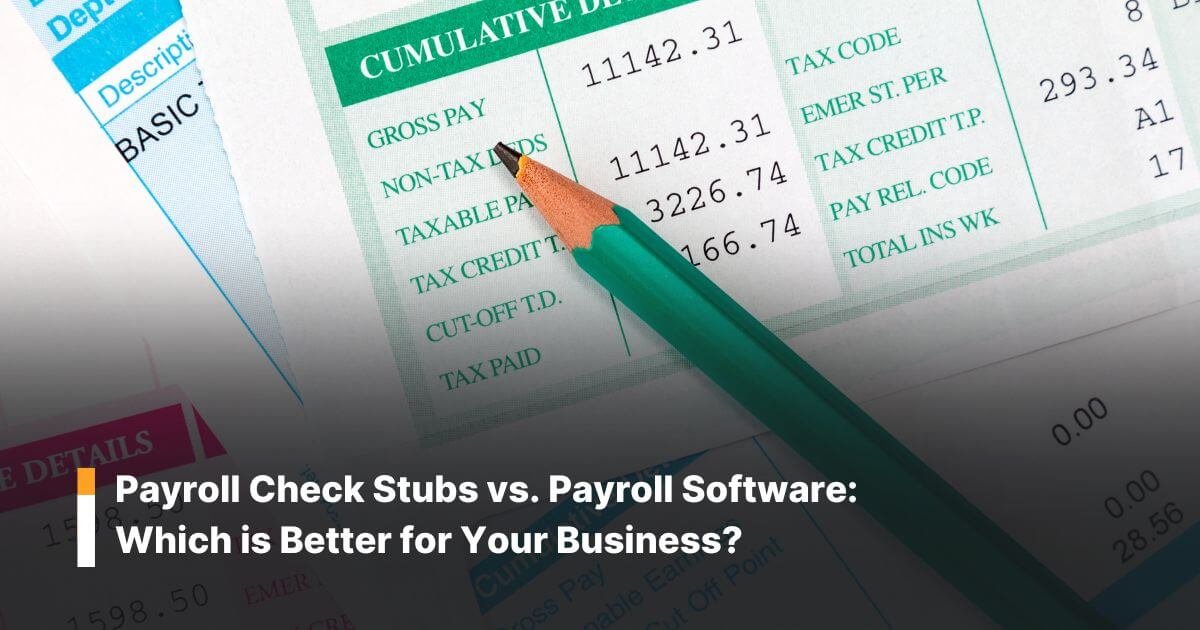Confused about which to choose from: payroll check stubs or payroll software? No matter if you’re a small business organization or a huge, growing firm, the confusion of payroll processing, tax compliance, and employee benefits management becomes mind-boggling for anybody.
Many businesses face the challenge of deciding whether they can handle the payroll in-house using the payroll check stubs tool or not. In this blog, we will discuss the key difference between payroll check stubs and payroll software. Let’s get started.
Payroll Software
Payroll software is a digital tool that industrializes the process of managing employee payments. It handles everything from calculating employee wages to tax compliance. Some of the highlighting features include:
- Automated Calculations: Precisely calculates salaries, deductions, and taxes
- Tax Filing: It assists you with the preparation and submission of tax documents.
- Time Tracking Integration: Syncing with a monitoring system to make accurate payroll based on the hours worked.
- Direct Deposit: Facilitates direct deposit payments to the employee’s bank account.
- Employee Self-Service: It provides a portal for employees to view their payslips, update personal information, and manage benefits.
Pros and Cons of Payroll Software
Below are the pros of the payroll software:
- Cost-Effective: Payroll software is an affordable tool, especially for small to mid-sized businesses. It generally includes one-time fees.
- Control and Flexibility: You have complete control over your payroll data, which will allow you to make real-time updates.
- Integration with Other Systems: Payroll software can blend in with other HR and accounting systems, generating a seamless workflow for your payroll business.
- Compliance Assistance: Many payroll software solutions are regularly updated to reflect changes in the tax laws, helping you stay compliant.
Below are the cons of the payroll software:
- Learning Curve: Integrating new software can require significant training for your team.
- Time-Consuming: With automation, manual input and oversight are necessary, which can take time.
- Technical Issue: Software can experience glitches or potentially damage your payroll process.
- In-House Responsibilities: You are responsible for ensuring data accuracy and compliance, which can become burdensome if you do not have dedicated resources.
Payroll Check Stubs
Payroll check stubs are the checks that an employer issues to an employee for their work. The amount on the check depends on the employee’s gross pay minus the taxes or any other deductions withheld from their paycheck. Businesses use payroll check stubs to pay employees for their time and usually issue them biweekly, monthly, or weekly.
Pros and Cons of Payroll Check Stubs
Below are the pros of the payroll check stubs:
- Proof of income: Employees can use pay stubs to verify their income while applying for loans, renting an apartment, or for other purposes requiring proof of income.
- Transparency: It provides you with a detailed breakdown of pay components, and it allows employees to understand how their paycheck is calculated, including taxes and deductions.
- Monitoring Earnings: Employees can easily monitor their gross pay, overtime, and any changes in their compensation over time.
- Record Keeping: Employers can record employee pay details for compliance and reference purposes.
- Benefit Tracking: Some pay stubs might also show accrued paid time off or other benefits.
Below are the cons of the payroll check stubs:
- Potential Loss: Paper pay stubs can be easily misplaced or lost, generating inconvenience for employees who need to access their payment information.
- Administrative Burden: Printing and distributing paper check stubs can be a time-consuming process.
- Security Concerns: Sensitive information on a pay stub can be exposed if not stored securely.
Payroll Check Stubs vs. Payroll Software: Which is Better?
If you run a small business with a few employees, payroll check stubs may be sufficient. But if you’re running a large organization with multiple employees at your disposal, then payroll software should be your preferred choice.
As businesses grow rapidly, payroll software scales with them, offering special features such as direct deposits and integration with accounting software.
However, as the business expands, the risk of errors, missed opportunities, and compliance insurance issues arises.
Key Takeaways
Choosing between payroll check stubs and payroll software usually depends on the business’s requirements, size, and future growth direction.
It’s a matter of payroll check stubs versus payroll software, whichever suits your business requirements, size, and long-term goal. Payroll check stubs may work for small businesses with only a handful of employees, but they can be quite tiring and error-prone as the business grows.
FAQ's
What’s the difference between payroll check stubs and payroll software?
+
Payroll check stubs are individual records of employee earnings and deductions, while payroll software automates the entire payroll process, including generating stubs, calculating taxes, and filing reports.
Is payroll software better than manually creating check stubs?
+
Yes, payroll software is generally more efficient, reduces human error, and ensures compliance with tax regulations, especially for businesses with multiple employees or complex payroll needs.
When should a business use just payroll check stubs?
+
Small businesses or freelancers with simple payroll needs and a limited number of employees may find it cost-effective to use only check stubs created with free tools.
Which option is more cost-effective: payroll software or check stub generators?
+
Free check stub generators are more budget-friendly for basic needs, but payroll software offers long-term value with automation, accuracy, and compliance support for growing businesses.





